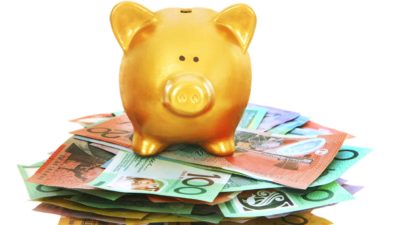I have to say, from time to time, I give the headline-writers heaps.
I bag them for the "$X billion wiped off the market" line.
And I criticise them for putting the occasional short-term drops ahead of the phenomenal long-term wealth creation story that is the stock market.
But, to give them their due, there's plenty of nuance there, too.
Case in point is the Seven Network's Sunrise program.
They are kind enough to invite me on the program most Sunday mornings (7.45am AEDT, thanks for asking!) to talk about money and finance.
We already had yesterday's topics lined up, when I got an email from them.
"Hey Scott. I saw your tweets yesterday and thought it was a perfect way to get into the segment.
"So I've just done a re-write on the segment, if you're happy with that?"
It worked for me.
They didn't lead with fear and destruction.
Instead they went with one of my tweets:
"For God's sake, people… chill out!"
My tweet was out of frustration that the lemmings, all calm and optimistic when share prices are rising, were suddenly following each other off the cliff.
So much so that CommSec's website was crashing, and apparently Friday set a record for the value of shares traded.
"What do investors actually need to know?" The Sunrise team asked, on air.
"What should they do"
I went back to my tweet: They should just chill out.
Apparently not everyone liked that advice.
"But the Coronavirus!", they yelled.
Yes, yes, Coronavirus.
It's real. It's a thing.
It'll probably shake the economy, in the short term.
We don't know how bad it'll get.
We don't know how long it'll last.
And we don't know how badly it'll impact individual companies.
But those are only the surface-level issues for investors.
Here's the thing:
Even if we knew all that, answer me this:
How will share prices respond?
"Well, they'll fall, right."
Sure.
But how much?
"I don't know. More, I guess"
Really? More than what?
And based on what? GDP?
Oh, like how GDP grew only modestly last year, but shares gained around 25%?
Like that?
Here's something that might surprise you: the correlation between GDP and stock market returns is weak, at best.
Not only that, but markets look forward.
So, at some point before actual profits pick up again, we should expect share prices to rise.
How much earlier?
No-one knows.
In 12 months' time, we'll be able to look back and pinpoint the very bottom.
And, if you have a time machine, you're in luck! You can go back and buy.
If you don't?
Well, as I said, that makes things a little difficult.
Oh, you'll wait until shares start rising again?
Which time? When they're up 2% from some recent low point?
You know they can start falling again?
5%? 10%?
Good luck with that.
I mean, you have experience doing that successfully, right?
And the emotional strength and cast-iron stomach required?
Really?
No, I'm not having a go at anyone (well, other than those who like to tell people how smart they are with their complex trading strategies that make so much money by correctly timing the market).
I'm simply saying if you can't do these things with any proven accuracy, what are you doing trying?
Me? I'm just trying to buy stocks when they're cheap, relative to their long term earnings power.
I want to buy something for $10 that'll be worth $20 in 5 years' time.
Sure, they might go to $9, $8 or even $6 in the meantime.
Or not.
Why should I care?
I mean, if you were timing the market, you were fully invested on January 1, 2019, right? Because you knew the Nov-Dec 2018 market swoon was over, and we were about to have a stellar 12 months.
Oh, you didn't?
I didn't think so.
Me either.
But then, I'm not the one trying to tell you I can time the market.
I just buy when prices look good, and hold the shares through the turbulence.
No, it doesn't get me bragging rights on social media.
No, I don't use those clever little Twitter hashtags that the self-appointed intelligensia — the ones who know exactly what's coming next — use.
(Oh, they're all very clever — and not just a little self-righteous. And no, you don't have to find them — they'll find you.)
And so?
I just keep doing what I've always done: save regularly, invest regularly (and a little more when stocks seem cheaper than usual) and let time and the magic of compounding do the rest.
Yes, my portfolio swooned in 2008/9.
Then it bounced back.
And the funds I added in 2009 are doing wonderfully, thank you very much.
Yes, my portfolio is swooning now.
It hasn't (yet) bounced back.
The funds I added last week are in the red.
That's okay — it would have been dumb luck if I'd picked the bottom.
I've made good money over the last decade.
I expect to make even more over the next decade.
In between? The markets will almost certainly do what they do — two-dozen would-be crises for every 'actual' crisis, and steadily increase — two steps forward, one step back — regardless.
Sure, try to time the market if you need to prove you're clever.
Maybe you are.
Or maybe the market will teach you an expensive lesson.
If you don't need to prove you're clever, just keep investing regular amounts.
Buy quality companies with good long-term outlooks.
Sometimes, when prices are high, you'll get fewer shares for your money. Other times, you'll get more.
And, over time, history tells us markets keep marching upwards over the long term.
Not in a straight line. Not every year.
But at a compound rate that makes it worthwhile.
Fool on!








